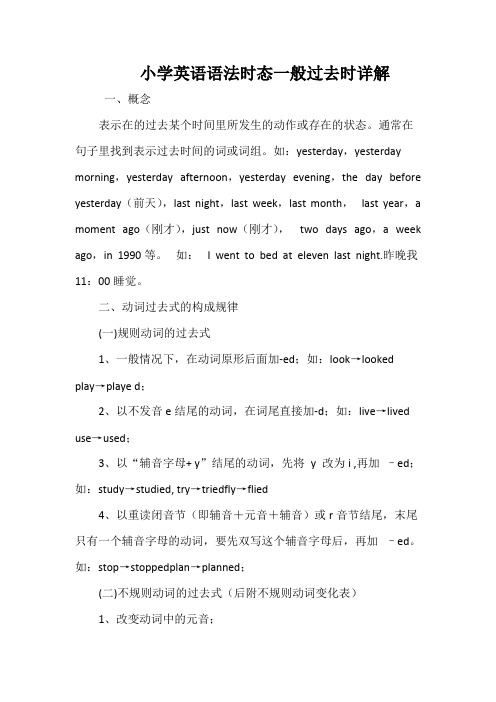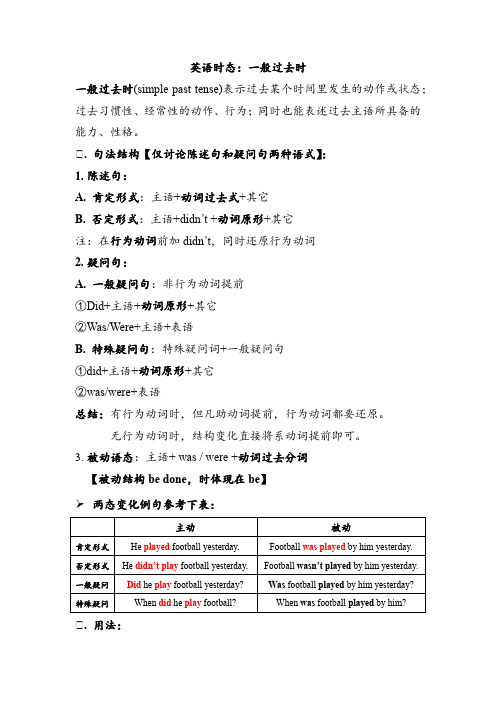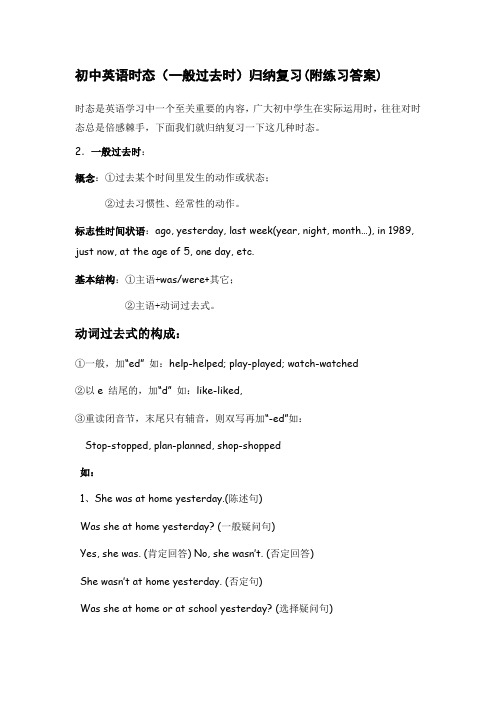英语时态之一般过去时
英语时态一般过去时知识清单总结及用法

英语时态一般过去时知识清单总结及用法1、一般过去时的结构
2、一般过去时的结构变化
.
3、知识要点
一般过去时的用法
(1) 表示过去某一时间内发生的动作或存在的状态,常与表示过去的时间状语连用。
如:yesterday,last week,an hour ago(一个小时前),the other day(不久前的一天),just now(刚才),once upon a time(从前),in 1979(在1979年),in the old days(在过去的日子里)等。
如:Did you have a meeting yesterday ? 昨天你们开会了吗?
She left here just now. 她刚刚离开这儿。
My father got home at 10 o'clock last night. 我父亲昨晚十点到家。
We didn't have any money at that time . 那时候我们没有钱。
(2) 表示过去一段时间内经常或反复的动作或状态。
常与always (总是),never(从不)等连用。
如:
I never drank wine. 我从前从不喝酒。
She got up very early at that time . 她那时总是很早起床。
(完整)小学英语语法时态一般过去时详解

小学英语语法时态一般过去时详解一、概念表示在的过去某个时间里所发生的动作或存在的状态。
通常在句子里找到表示过去时间的词或词组。
如:yesterday,yesterday morning,yesterday afternoon,yesterday evening,the day before yesterday(前天),last night,last week,last month,last year,a moment ago(刚才),just now(刚才),two days ago,a week ago,in 1990等。
如:I went to bed at eleven last night.昨晚我11:00睡觉。
二、动词过去式的构成规律(一)规则动词的过去式1、一般情况下,在动词原形后面加-ed;如:look→looked play→playe d;2、以不发音e结尾的动词,在词尾直接加-d;如:live→lived use→used;3、以“辅音字母+ y”结尾的动词,先将y 改为i ,再加–ed;如:study→studied, try→triedfly→flied4、以重读闭音节(即辅音+元音+辅音)或r音节结尾,末尾只有一个辅音字母的动词,要先双写这个辅音字母后,再加–ed。
如:stop→stoppedplan→planned;(二)不规则动词的过去式(后附不规则动词变化表)1、改变动词中的元音;begin→began drink→drank come→came eat→ate grow→grew run→ran know→knew win→wonspeak→spoketake→took write→wrote get→got2、变词尾的–d 为–t ;build→built lend→lent send→sent spend→spent bend→bent3、与动词原形一样;cut→cut put→put cost→cost hurt→hurt shut→shut4、变-ay 为-aid (少数动词);say→said pay→paid lay→laid5、采用不同词根;sell→sold teach→taught buy→bought6、其他。
高中英语十六种时态用法详解之一般过去时

play — played,offer — offered,weigh —
的那段记忆以后,捧腹大笑:“你怎么这么搞笑哦,这么花痴哦。”只有
weighed,destroy
—
destroyed,sign
—
signed.(2)在以字母 e 结尾的动词后,只加-d。 如:like—liked,provide—provided,hate— hated,date—dated。(3)在以“辅音字母+y”结 尾的动词后,则改 y 为 i,再加—ed。如: supply — supplied,fly — flied,study — studied.(4) 在以单短元音的重读闭音节结尾且,末尾只有一
。
常
与
过
去
时
间
yesterday,thismorning,justnow,amomentago, inMay,lastnight/year/week,onceuponatime,t heotherday,before „ ,when clause,inthepast 连 用 。 如 – :
Whatdidyoudoyesterday? 昨 天 你 干 了 什 么 ? ImetLinTaothismorning.今天上午我会到了林 涛。Iwasthereamomentago.刚才我在那儿。2.一
—
时,后接不定式的完成时;或它们的过去完成时
Hale Waihona Puke 接不定式的一般式,都可表示过去未曾实现的意 图 、 打 算 或 希 望 。 如 :
Ihopedtohavebeeninvitedtohisweddingparty.
的那段记忆以后 — I hadhopedtobeinvitedtohisweddingceremony. 我本希望他来邀请我参加他的婚礼。
小学英语时态之 一般过去时讲解课件ppt

一般过去时:
定义: 一般过去时,是表示过去某一时刻或某一段时间内发生的动作或存在
的状态。
标志词: yesterday, just now, …ago, last…, this morning …
结构: 谓语是be动词
谓语是行为动词
肯定句: 主语+ was/were + 其他 否定句: 主语+ was/were + not + 其他 一般疑问句: Was/Were + 主语+其他? 肯定句: 主语+ 动词的过去式 + 其他 否定句: 主语+ didn’t +动词原形 + 其他 一般疑问句:Did + 主语+ 动词原形 +其他?
at the weekends this morning often
usually
last Mid-Autumn Festival
every day three days ago on Mondays
tomorrow a moment ago 14 years ago
找出表示一般过去时的时间副词。
( B) 1. My mother had breakfast and____to work.
A. go B. went C. going D. to go
( A)2. -- How __ your vacation?
-- It was pretty good. A. was B. were C. did D. do
( )3.Each student one picture.
A.draw B. draws C. drawing D.to drawing
英语一般过去时语法知识点

英语一般过去时语法知识点英语一般过去时(Simple Past Tense)是表示过去某个时间发生或存在的动作或状态的一种时态。
以下是英语一般过去时的语法知识点:1. 句子结构:主语+ 动词过去式+ 其他成分。
2. 动词过去式的构成:- 一般情况下,直接在动词原形后面加-ed。
例如:play →played,watch →watched,want →wanted。
- 以不发音的字母“e”结尾的动词,在加-ed前先去掉“e”。
例如:live →lived,change →changed。
- 以辅音字母+y结尾的动词,将y变为i再加-ed。
例如:study →studied,carry →carried。
- 一些不规则动词的过去式需要记忆,例如:go →went,eat →ate,see →saw,do →did。
3. 动词过去式的否定和疑问形式:- 否定形式:主语+ did not + 动词原形+ 其他成分。
缩写为didn't。
例如:I didn't play tennis yesterday.- 疑问形式:Did + 主语+ 动词原形+ 其他成分例如:Did you watch the movie last night?4. 一般过去时的时间状语:昨天(yesterday)、上个月(last month)、去年(last year)等表示过去某个具体时间的时间状语。
5. 一般过去时的用法:- 表示过去某个具体时间发生的动作或状态。
例如:I went to the beach yesterday.- 表示过去一段时间内发生的动作或状态。
例如:I lived in London for two years.- 表示过去习惯性的动作或状态。
例如:When I was a child, I always played with my friends.以上就是英语一般过去时的语法知识点。
记得多加练习,熟练掌握一般过去时的用法。
英语时态:一般过去时

英语时态:一般过去时一般过去时(simple past tense)表示过去某个时间里发生的动作或状态;过去习惯性、经常性的动作、行为;同时也能表述过去主语所具备的能力、性格。
Ⅰ. 句法结构【仅讨论陈述句和疑问句两种语式】:1.陈述句:A. 肯定形式:主语+动词过去式+其它B. 否定形式:主语+didn’t +动词原形+其它注:在行为动词前加didn’t,同时还原行为动词2.疑问句:A. 一般疑问句:非行为动词提前①Did+主语+动词原形+其它②Was/Were+主语+表语B. 特殊疑问句:特殊疑问词+一般疑问句①did+主语+动词原形+其它②was/were+表语总结:有行为动词时,但凡助动词提前,行为动词都要还原。
无行为动词时,结构变化直接将系动词提前即可。
3.被动语态:主语+ was / were +动词过去分词【被动结构be done,时体现在be】➢两态变化例句参考下表:Ⅰ. 用法:1.一般过去时表示在过去某个特定时间发生,也可以表示过去习惯性、经常性的动作。
(一般不强调动作的影响,只说明的事情。
)I talked with Catherine yesterday morning.His mother cooked him breakfast.2.一般过去时常与表示过去的时间状语或从句连用,如:yesterday, last week, in the past, in 1993, at that time, once, during the war, before, a few days ago, when 等。
3.表示过去连续发生的动作时,要用过去时。
这种情况下,往往没有表示过去的时间状语,而通过上下文来表示。
The boy cried for a while,and then drank a cup of tea.4.表示在此之前一段时间内经常或反复的动作。
常与always,never 等连用。
英语时态复习之一般过去时

初中英语时态(一般过去时)归纳复习(附练习答案)时态是英语学习中一个至关重要的内容,广大初中学生在实际运用时,往往对时态总是倍感棘手,下面我们就归纳复习一下这几种时态。
2.一般过去时:概念:①过去某个时间里发生的动作或状态;②过去习惯性、经常性的动作。
标志性时间状语:ago, yesterday, last week(year, night, month…), in 1989, just now, at the age of 5, one day, etc.基本结构:①主语+was/were+其它;②主语+动词过去式。
动词过去式的构成:①一般,加“ed”如:help-helped; play-played; watch-watched②以e 结尾的,加“d” 如:like-liked,③重读闭音节,末尾只有辅音,则双写再加“-ed”如:Stop-stopped, plan-planned, shop-shopped如:1、She was at home yesterday.(陈述句)Was she at home yesterday? (一般疑问句)Yes, she was. (肯定回答) No, she wasn’t. (否定回答)She wasn’t at home yesterday. (否定句)Was she at home or at school yesterday? (选择疑问句)She was at home yesterday, wasn’t she? (反意疑问句) Where was she yesterday? (特殊疑问句)2、He went to Shanghai two days ago. (陈述句)He didn't go to Shanghai two days ago. (否定句)Did he go to Shanghai two days ago? (一般疑问句)Yes, he did. (肯定回答) No, he didn't. (否定回答)Did he go to Shanghai or Shenzhen two days ago? (选择疑问句) He went to Shanghai two days ago, didn't he? (反意疑问句) When did he go to Shanghai? (特殊疑问句)Where did he go two days ago? (特殊疑问句)露一小手一般过去时练习一、请用正确动词形式填空。
初中英语语法-八大时态之一般过去时课件全文

一般过去时疑问句
对于含有是实意动词的句子, 一般疑问句: Did +主语+动词其他…? 特殊疑问句:疑问词+ did(didn’t)+主语+其它? What did you do yesterday? Why did you go there the day before yesterday? Whose father came to see our teacher just now?
Theyw_e_r_e from Japan. I _w_a_s very tired.
4. He is too young to go to school.
Hew_a_s_too young to go to school.
5. You are late for school. Youw_e_r_e late for school.
一般过去时-不含有be动词型
把句子中的动词改为过去式形式。
通常有5种写法。
动词过去式的写法:
01 一般情况词尾加ed 02 e结尾直接在词尾加d 03 辅音加y结尾变y为i加ed 04 重读闭音节结尾双写词尾字母加ed 05 特殊情况
I work in this city. I worked in this city last year.
We are friends.
We weren't friends.
2.当谓语动词是实意动词时,它 与助动词did有关
主语+did + not+ 动词
动词谓语一定要恢复为原形。
一般过去时否定式
主语+did + not+ 动词原型
- 1、下载文档前请自行甄别文档内容的完整性,平台不提供额外的编辑、内容补充、找答案等附加服务。
- 2、"仅部分预览"的文档,不可在线预览部分如存在完整性等问题,可反馈申请退款(可完整预览的文档不适用该条件!)。
- 3、如文档侵犯您的权益,请联系客服反馈,我们会尽快为您处理(人工客服工作时间:9:00-18:30)。
英语时态--- 一般过去时1.表过去发生的事情或存在的状态eg Suddenly,the clouds cleared and the rain stopped.2.表过去经常发生的事情eg I was very thin in my childhood.3.带有确定的过去的时间状语eg Did you meet yesterday He left just now.基本结构:①be动词(was. were);②行为动词(过去时)1.直接加ed:work—— worked look——looked2.以不发音e结尾的单词,直接加d:live ——lived hope——hoped use——used3.以辅音字母+y结尾的,变y为i加ed:study——studied carry——carried worry——worried4.以重读闭音节结尾的,双写最后的辅音字母+ed:stop—— stopped plan——planned5.不规则变化的动词过去式:have---had are---were get---got say---said feel---feltdo/does---did is---was go---went drink--drank eat--atebring----brought think----thought buy----bought catch---- caught teach ---- taught sit----sat wear----wore cut----cut sweep----swept sleep——slept become----became句法结构1、肯定形式主语+动词过去式+其他例句:She often came to help us in those days.2、否定形式①was/were+not;②在行为动词前加didn't,同时还原行为动词例句:I didn't know you like coffee.3、一般疑问句①Did+主语+谓语动词原型+其他②Was\Were+主语+表语例句:Did I do homework习题:一、写出下列动词的过去式is\am_________ fly_______ plant________ are________ drink_________play_______ go________ make ________does_________ dance________worry________ ask _____ eat__________ draw________ do ________put______ pass_______ read_______二、用be动词的适当形式填空1. I ______ an English teacher now.2. She _______ happy yesterday.3. They _______ glad to see each other last month.4. Helen and Nancy ________ good friends.5. The little dog _____ two years old this year.6. Look, there ________ lots of grapes here.7. There ________ a sign on the chair on Monday.8. Today _____ the second of June. Yesterday ______ the first of June. It _____ Children's Day. All the students ______ very excited.三、句型变换1 There was a car in front of the house just now.否定句:__________________________________________________________一般疑问句:_________________________________________________________肯定回答:__________________________________________________________否定回答:__________________________________________________________2 They played football in the playground.否定句:__________________________________________________________一般疑问句:__________________________________________________________肯定回答:__________________________________________________________否定回答:__________________________________________________________四、用所给动词的适当形式填空1. I ______ (watch) a cartoon on Saturday.2. Her father _______ (read) a newspaper last night.3. We _________ to zoo yesterday, we _____ to the park. (go)4. ______ you _______ (visit) your relatives last Spring Festival5. ______ he _______ (fly) a kite on Sunday Yes, he ______.6. Gao Shan _______ (pull) up carrots last National Day holiday.7. I ____________ (sweep) the floor yesterday, but my mother ______.8. What _________ she _________ (find) in the garden last morningShe _________ (find) a beautiful butterfly.9. It _________ (be) Ben's birthday last Friday10. 10. We all _________ (have) a good time last night.11. He _________ (jump) high on last Sports Day.12. 12. Helen _________ (milk) a cow on Friday.13. She likes _________ newspapers, but she _________ a book yesterday. (read)14. He _______ football now, but they _______ basketball just now. (play)15. Jim's mother _________ (plant) trees just now.16. _______ they ________ (sweep) the floor on Sunday No, they_________.17. I _______ (watch) a cartoon on Monday.18 We ____ (go) to school on Sunday.19. It ____ (be) the 2nd of November yesterday. Mr White ___ (go) to his office by car.20. Gao Shan ________ (put) the book on his head a moment ago.21. Don't ______ the house. Mum _______ it yesterday. (clean)22. What _________ you ______ just now I _______ some housework. (do)23. They _________ (make) a kite a week ago.24. I want to ______ apples. But my dad _______ all of them last month. (pick)25. _______ he ______ the flowers this morning Yes, he _____. (water)26. She ____ (be) a pretty girl. Look, she _____ (do) Chinese dances.27. The students often _________ (draw) some pictures in the art room.______ Mike do on the farm He ________ cows. (milk)五、句型转换1、Lucy did her homework at home.(改否定句)Lucy ___________ ___________ her homework at home.2、He found some meat in the fridge(冰箱).(变一般疑问句)___________ he __________ ___________ meat in the fridge3、She stayed there for a week.(对划线部分提问)__________ ___________ __________ she __________ there 4、There was some orange in the cup.(变一般疑问句)_________ there ___________ orange in the cup。
